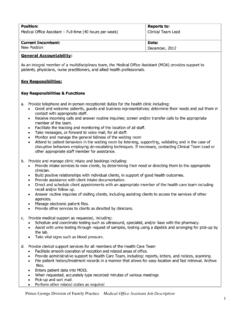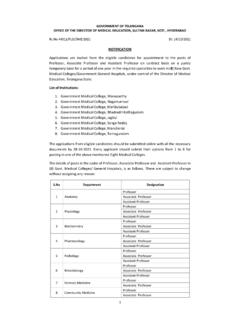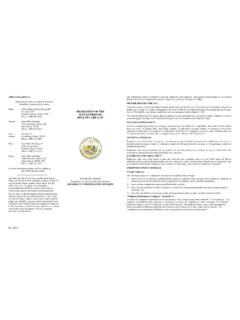Transcription of MEDICAL ANTHROPOLOGY - Princeton University
1 MEDICAL ANTHROPOLOGY we go. we make house calls. we build health systems. we stay. Partners in Health What is MEDICAL ANTHROPOLOGY ? MEDICAL ANTHROPOLOGY is a subfield of ANTHROPOLOGY that draws upon social, cultural, biological, and linguistic ANTHROPOLOGY to better understand those factors which influence health and well being (broadly defined), the experience and distribution of illness, the prevention and treatment of sickness, healing processes, the social relations of therapy management, and the cultural importance and utilization of pluralistic MEDICAL systems. The discipline of MEDICAL ANTHROPOLOGY draws upon many different theoretical approaches. It is as attentive to popular health culture as bioscientific epidemiology, and the social construction of knowledge and politics of science as scientific discovery and hypothesis testing.
2 MEDICAL anthropologists examine how the health of individuals, larger social formations, and the environment are affected by interrelationships between humans and other species; cultural norms and social institutions; micro and macro politics; and forces of globalization as each of these affects local worlds. MEDICAL Anthropologists Health ramifications of ecological adaptation and maladaptation Popular health culture and domestic health care practices Local interpretations of bodily processes Perceptions of risk, vulnerability and responsibility for illness and health care Risk and protective dimensions of human behavior, cultural norms and social institutions Preventative health and harm reduction practices The experience of illness and the social relations of sickness The range of factors driving health, nutrition and health care transitions MEDICAL practices in the context of modernity, colonial.
3 And post-colonial social formations The use and interpretation of pharmaceuticals and forms of biotechnology Disease distribution and health disparity The political ecology of infectious and vector borne diseases, chronic diseases and states of malnutrition, and violence The possibilities for a critically engaged yet clinically relevant application of ANTHROPOLOGY ..and more Become a MEDICAL Anthropologist Get a Bachelor s Degree Aspiring MEDICAL anthropologists must begin by earning a bachelor's degree. A major in ANTHROPOLOGY can prepare students for this career field. Coursework in ANTHROPOLOGY includes language, culture, research methods and religion. Other useful classes are those in statistics, math, quantitative research and research analysis. Students may also study nursing, public health or other MEDICAL fields with coursework focusing on science and health.
4 Complete an Internship Many ANTHROPOLOGY programs require or recommend an internship. Students who participate in internship programs gain experience working with a variety of organizations that they may encounter as professional MEDICAL anthropologists, including museums, libraries, government agencies and cultural institutions. They practice researching, recording and reporting information. Get a Master s Degree or Most employers require job candidates to have a master's degree or in MEDICAL ANTHROPOLOGY . Studies at the graduate level include health and life cycles, ethno and alternative medicine, sexuality and gender. Students may also study MEDICAL ethics, geriatrics and public health. Complementary degrees include a Master of Public Health or MEDICAL Doctorate. Conduct Research Both students and professional MEDICAL anthropologists conduct research.
5 Learning to compile and organize collected information requires attention to detail, organization and an open mind. MEDICAL anthropologists must also be willing to travel and live in unusual situations in order to study cultures. They must be patient and willing to work on projects that can span years. Research topics range from the spread and prevalence of illness among designated groups to the morals of medicine and the stigmas of mental illness. Meet Paul Farmer (1959- ) Paul Farmer, MD, PhD, is an American anthropologist and physician, but also an avid human rights activist, fighting to provide health care for the world s poorest people. He has become something of a celebrity in MEDICAL ANTHROPOLOGY , a sub-field of cultural ANTHROPOLOGY , which examines cultural, social and other factors to discover how they influence health.
6 He has also worked on fighting infectious diseases and promoting basic human rights in both Peru and Russia. Being a physician and MEDICAL anthropologist, he has a unique insight into the understanding of native healers, while being able to offer his own treatments. Farmer has received many awards, including the Margaret Mead Award from the American Anthropological Association and a MacArthur Foundation Genius Award. Meet Margaret Mead (1901-1978) Margaret Mead is often regarded as the original rebel anthropologist of the United States, her easy-to-follow style of writing, controversial research regarding sex and outspoken personality heightened her fame even beyond the world of ANTHROPOLOGY . Her research brought her to the South Pacific, specifically Samoa, where she suggested that culture, not just biology, has an impact on adolescent behavior (this was published in her first book, Coming of Age in Samoa ).
7 Through close observation of Samoan children, and the ease with which they entered adulthood, Mead came to the conclusion that teenage angst and stress had more to do with external factors than anything internal. She continued to return to Samoa for research, but also collected information in Papua New Guinea and Bali. This breadth of information led her to publish more than 30 books and hundreds of other works. Her openness about her own methodologies as well as addressing sensitive research topics such as sexuality, made her one of the most talked about anthropologists and read authors in the world. Meet Jo o Biehl Jo o Biehl is Susan Dod Brown Professor of ANTHROPOLOGY and Woodrow Wilson School Faculty Associate at Princeton University . He is also the Co-Director of Princeton s Program in Global Health and Health Policy.
8 Prof. Biehl s main research and teaching interests center on MEDICAL ANTHROPOLOGY , the social studies of science and technology, global health, pharmaceuticals, religion and society, subjectivity, and ethnography and critical theory (with a regional focus on Latin America and Brazil). He has authored award winning books, Vita: Life in a Zone of Social Abandonment, and Will to Live: AIDS Therapies and the Politics of Survival- ethnographic studies of the experience and treatment of mental illness and AIDS, respectively. Both explore new geographies of access and marginalization that have emerged alongside pharmaceutical globalization. Prof. Biehl s present ethnographic research explores the social impact of large-scale treatment programs in resource-poor settings, the role of the judiciary in administering public health, and the emergence of the category of patient-citizen-consumers in Brazil.
9 Full bio Sample Publications Vita: Life in a Zone of Social Abandonment, Jo o Biehl Will to Live: AIDS Therapies and the Politics of Survival, Jo o Biehl The Valley of Lamentation (manuscript), Jo o Biehl When the People Come First: Evidence, Actuality, and Theory in Global Health (manuscript), Jo o Biehl To Repair the World: Paul Farmer Speaks to the Next Generation, Paul Farmer The Spirit Catches You and You Fall Down, Anne Fadiman Improvising Medicine: An African Oncology Ward in an Emerging Cancer Epidemic, Julie Livingston Vita is the end-station on the road of poverty. It is the place where living beings go when they are no longer considered people. Of love there is nothing Only emptiness What will become of the world? I am part of the origins, not just of language, but of Beyond the technical fix.
10 Persistent inequalities. The fragmentation of efforts. The unfinished. To think of life in terms of limits and crossroads. The right to a future. Health policies need to be directed at people, not simply disease. MEDICAL ANTHROPOLOGY Programs University of California, San Diego School of Medicine* (La Jolla, CA) University of California, San Francisco School of Medicine* (San Francisco, CA) Yale University School of Medicine* (New Haven, CT) Emory University School of Medicine* (Atlanta, GA) University of Chicago Pritzker School of Medicine* (Chicago, IL) University of Illinois at Urbana-Champaign College of Medicine (Urbana, IL) Harvard University * (Cambridge, MA) University of Michigan MEDICAL School* (Ann Arbor, MI) St. Louis University (St. Louis, MO) Washington University School of Medicine* (St.)






